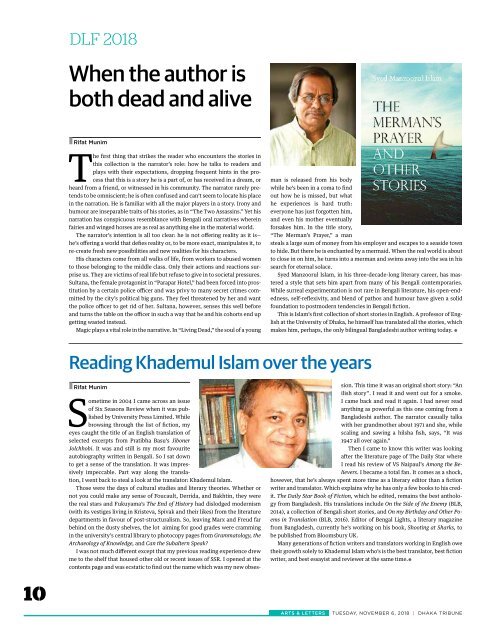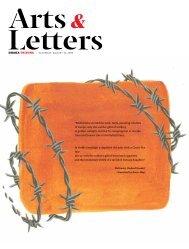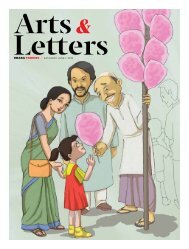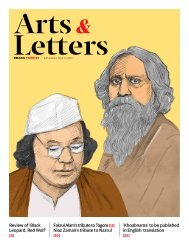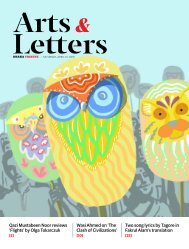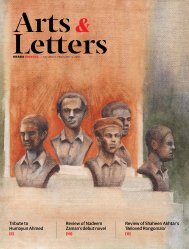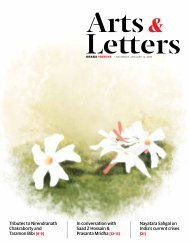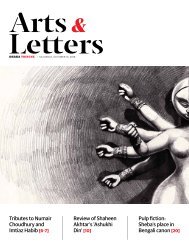A&L Nov_2018
Create successful ePaper yourself
Turn your PDF publications into a flip-book with our unique Google optimized e-Paper software.
DLF <strong>2018</strong><br />
When the author is<br />
both dead and alive<br />
• Rifat Munim<br />
The first thing that strikes the reader who encounters the stories in<br />
this collection is the narrator’s role: how he talks to readers and<br />
plays with their expectations, dropping frequent hints in the process<br />
that this is a story he is a part of, or has received in a dream, or<br />
heard from a friend, or witnessed in his community. The narrator rarely pretends<br />
to be omniscient; he is often confused and can’t seem to locate his place<br />
in the narration. He is familiar with all the major players in a story. Irony and<br />
humour are inseparable traits of his stories, as in “The Two Assassins.” Yet his<br />
narration has conspicuous resemblance with Bengali oral narratives wherein<br />
fairies and winged horses are as real as anything else in the material world.<br />
The narrator’s intention is all too clear: he is not offering reality as it is—<br />
he’s offering a world that defies reality or, to be more exact, manipulates it, to<br />
re-create fresh new possibilities and new realities for his characters.<br />
His characters come from all walks of life, from workers to abused women<br />
to those belonging to the middle class. Only their actions and reactions surprise<br />
us. They are victims of real life but refuse to give in to societal pressures.<br />
Sultana, the female protagonist in “Parapar Hotel,” had been forced into prostitution<br />
by a certain police officer and was privy to many secret crimes committed<br />
by the city’s political big guns. They feel threatened by her and want<br />
the police officer to get rid of her. Sultana, however, senses this well before<br />
and turns the table on the officer in such a way that he and his cohorts end up<br />
getting wasted instead.<br />
Magic plays a vital role in the narrative. In “Living Dead,” the soul of a young<br />
man is released from his body<br />
while he’s been in a coma to find<br />
out how he is missed, but what<br />
he experiences is hard truth:<br />
everyone has just forgotten him,<br />
and even his mother eventually<br />
forsakes him. In the title story,<br />
“The Merman’s Prayer,” a man<br />
steals a large sum of money from his employer and escapes to a seaside town<br />
to hide. But there he is enchanted by a mermaid. When the real world is about<br />
to close in on him, he turns into a merman and swims away into the sea in his<br />
search for eternal solace.<br />
Syed Manzoorul Islam, in his three-decade-long literary career, has mastered<br />
a style that sets him apart from many of his Bengali contemporaries.<br />
While surreal experimentation is not rare in Bengali literature, his open-endedness,<br />
self-reflexivity, and blend of pathos and humour have given a solid<br />
foundation to postmodern tendencies in Bengali fiction.<br />
This is Islam’s first collection of short stories in English. A professor of English<br />
at the University of Dhaka, he himself has translated all the stories, which<br />
makes him, perhaps, the only bilingual Bangladeshi author writing today. •<br />
Reading Khademul Islam over the years<br />
• Rifat Munim<br />
Sometime in 2004 I came across an issue<br />
of Six Seasons Review when it was published<br />
by University Press Limited. While<br />
browsing through the list of fiction, my<br />
eyes caught the title of an English translation of<br />
selected excerpts from Pratibha Basu’s Jiboner<br />
Jolchhobi. It was and still is my most favourite<br />
autobiography written in Bengali. So I sat down<br />
to get a sense of the translation. It was impressively<br />
impeccable. Part way along the translation,<br />
I went back to steal a look at the translator: Khademul Islam.<br />
Those were the days of cultural studies and literary theories. Whether or<br />
not you could make any sense of Foucault, Derrida, and Bakhtin, they were<br />
the real stars and Fukuyama’s The End of History had dislodged modernism<br />
(with its vestiges living in Kristeva, Spivak and their likes) from the literature<br />
departments in favour of post-structuralism. So, leaving Marx and Freud far<br />
behind on the dusty shelves, the lot aiming for good grades were cramming<br />
in the university’s central library to photocopy pages from Grammatology, the<br />
Archaeology of Knowledge, and Can the Subaltern Speak?<br />
I was not much different except that my previous reading experience drew<br />
me to the shelf that housed other old or recent issues of SSR. I opened at the<br />
contents page and was ecstatic to find out the name which was my new obsession.<br />
This time it was an original short story: “An<br />
ilish story”. I read it and went out for a smoke.<br />
I came back and read it again. I had never read<br />
anything as powerful as this one coming from a<br />
Bangladeshi author. The narrator casually talks<br />
with her grandmother about 1971 and she, while<br />
scaling and sawing a hilsha fish, says, “It was<br />
1947 all over again.”<br />
Then I came to know this writer was looking<br />
after the literature page of The Daily Star where<br />
I read his review of VS Naipaul’s Among the Believers.<br />
I became a total fan. It comes as a shock,<br />
however, that he’s always spent more time as a literary editor than a fiction<br />
writer and translator. Which explains why he has only a few books to his credit.<br />
The Daily Star Book of Fiction, which he edited, remains the best anthology<br />
from Bangladesh. His translations include On the Side of the Enemy (BLB,<br />
2014), a collection of Bengali short stories, and On my Birthday and Other Poems<br />
in Translation (BLB, 2016). Editor of Bengal Lights, a literary magazine<br />
from Bangladesh, currently he’s working on his book, Shooting at Sharks, to<br />
be published from Bloomsbury UK.<br />
Many generations of fiction writers and translators working in English owe<br />
their growth solely to Khademul Islam who’s is the best translator, best fiction<br />
writer, and best essayist and reviewer at the same time.•<br />
10<br />
ARTS & LETTERS<br />
TUESDAY, NOVEMBER 6, <strong>2018</strong> | DHAKA TRIBUNE


